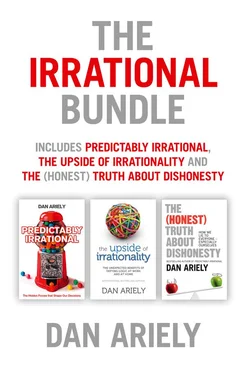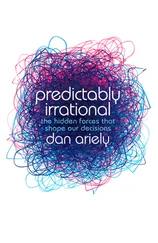Dan Ariely - The Irrational Bundle
Здесь есть возможность читать онлайн «Dan Ariely - The Irrational Bundle» — ознакомительный отрывок электронной книги совершенно бесплатно, а после прочтения отрывка купить полную версию. В некоторых случаях можно слушать аудио, скачать через торрент в формате fb2 и присутствует краткое содержание. Жанр: unrecognised, на английском языке. Описание произведения, (предисловие) а так же отзывы посетителей доступны на портале библиотеки ЛибКат.
- Название:The Irrational Bundle
- Автор:
- Жанр:
- Год:неизвестен
- ISBN:нет данных
- Рейтинг книги:3 / 5. Голосов: 1
-
Избранное:Добавить в избранное
- Отзывы:
-
Ваша оценка:
- 60
- 1
- 2
- 3
- 4
- 5
The Irrational Bundle: краткое содержание, описание и аннотация
Предлагаем к чтению аннотацию, описание, краткое содержание или предисловие (зависит от того, что написал сам автор книги «The Irrational Bundle»). Если вы не нашли необходимую информацию о книге — напишите в комментариях, мы постараемся отыскать её.
The Irrational Bundle — читать онлайн ознакомительный отрывок
Ниже представлен текст книги, разбитый по страницам. Система сохранения места последней прочитанной страницы, позволяет с удобством читать онлайн бесплатно книгу «The Irrational Bundle», без необходимости каждый раз заново искать на чём Вы остановились. Поставьте закладку, и сможете в любой момент перейти на страницу, на которой закончили чтение.
Интервал:
Закладка:
All this extravagance in CEOs’ pay has had a damaging effect on society. Instead of causing shame, every new outrage in compensation encourages other CEOs to demand even more. “In the Web World,” according to a headline in the New York Times, the “Rich Now Envy the Superrich.”
In another news story, a physician explained that he had graduated from Harvard with the dream of someday receiving a Nobel Prize for cancer research. This was his goal. This was his dream. But a few years later, he realized that several of his colleagues were making more as medical investment advisers at Wall Street firms than he was making in medicine. He had previously been happy with his income, but hearing of his friends’ yachts and vacation homes, he suddenly felt very poor. So he took another route with his career—the route of Wall Street. 3By the time he arrived at his twentieth class reunion, he was making 10 times what most of his peers were making in medicine. You can almost see him, standing in the middle of the room at the reunion, drink in hand—a large circle of influence with smaller circles gathering around him. He had not won the Nobel Prize, but he had relinquished his dreams for a Wall Street salary, for a chance to stop feeling “poor.” Is it any wonder that family practice physicians, who make an average of $160,000 a year, are in short supply? * Конец ознакомительного фрагмента. Текст предоставлен ООО «ЛитРес». Прочитайте эту книгу целиком, купив полную легальную версию на ЛитРес. Безопасно оплатить книгу можно банковской картой Visa, MasterCard, Maestro, со счета мобильного телефона, с платежного терминала, в салоне МТС или Связной, через PayPal, WebMoney, Яндекс.Деньги, QIWI Кошелек, бонусными картами или другим удобным Вам способом.
CAN WE DO anything about this problem of relativity?
The good news is that we can sometimes control the “circles” around us, moving toward smaller circles that boost our relative happiness. If we are at our class reunion, and there’s a “big circle” in the middle of the room with a drink in his hand, boasting of his big salary, we can consciously take several steps away and talk with someone else. If we are thinking of buying a new house, we can be selective about the open houses we go to, skipping the houses that are above our means. If we are thinking about buying a new car, we can focus on the models that we can afford, and so on.
We can also change our focus from narrow to broad. Let me explain with an example from a study conducted by two brilliant researchers, Amos Tversky and Daniel Kahneman. Suppose you have two errands to run today. The first is to buy a new pen, and the second is to buy a suit for work. At an office supply store, you find a nice pen for $25. You are set to buy it, when you remember that the same pen is on sale for $18 at another store 15 minutes away. What would you do? Do you decide to take the 15-minute trip to save the $7? Most people faced with this dilemma say that they would take the trip to save the $7.
Now you are on your second task: you’re shopping for your suit. You find a luxurious gray pinstripe suit for $455 and decide to buy it, but then another customer whispers in your ear that the exact same suit is on sale for only $448 at another store, just 15 minutes away. Do you make this second 15-minute trip? In this case, most people say that they would not.
But what is going on here? Is 15 minutes of your time worth $7, or isn’t it? In reality, of course, $7 is $7—no matter how you count it. The only question you should ask yourself in these cases is whether the trip across town, and the 15 extra minutes it would take, is worth the extra $7 you would save. Whether the amount from which this $7 will be saved is $10 or $10,000 should be irrelevant.
This is the problem of relativity—we look at our decisions in a relative way and compare them locally to the available alternative. We compare the relative advantage of the cheap pen with the expensive one, and this contrast makes it obvious to us that we should spend the extra time to save the $7. At the same time, the relative advantage of the cheaper suit is very small, so we spend the extra $7.
This is also why it is so easy for a person to add $200 to a $5,000 catering bill for a soup entrée, when the same person will clip coupons to save 25 cents on a one-dollar can of condensed soup. Similarly, we find it easy to spend $3,000 to upgrade to leather seats when we buy a new $25,000 car, but difficult to spend the same amount on a new leather sofa (even though we know we will spend more time at home on the sofa than in the car). Yet if we just thought about this in a broader perspective, we could better assess what we could do with the $3,000 that we are considering spending on upgrading the car seats. Would we perhaps be better off spending it on books, clothes, or a vacation? Thinking broadly like this is not easy, because making relative judgments is the natural way we think. Can you get a handle on it? I know someone who can.
He is James Hong, cofounder of the Hotornot.com rating and dating site. (James, his business partner Jim Young, Leonard Lee, George Loewenstein, and I recently worked on a research project examining how one’s own “attractiveness” affects one’s view of the “attractiveness” of others.)
For sure, James has made a lot of money, and he sees even more money all around him. One of his good friends, in fact, is a founder of PayPal and is worth tens of millions. But Hong knows how to make the circles of comparison in his life smaller, not larger. In his case, he started by selling his Porsche Boxster and buying a Toyota Prius in its place. 4
“I don’t want to live the life of a Boxster,” he told the New York Times, “because when you get a Boxster you wish you had a 911, and you know what people who have 911s wish they had? They wish they had a Ferrari.”
That’s a lesson we can all learn: the more we have, the more we want. And the only cure is to break the cycle of relativity.
Reflections on Dating and Relativity
In Chapter 1, on relativity, I offered some dating advice. I proposed that if you want to go bar-hopping, you should consider taking along someone who looks similar to you but who is slightly less attractive than you are. Because of the relative nature of evaluations, others would perceive you not only as cuter than your decoy, but also as better-looking than other people in the bar. By the same logic, I also pointed out that the flip side of this coin is that if someone invites you to be his or her wingman (or wingwoman), you can easily figure out what your friend really thinks of you. As it turns out, I forgot to include one important warning that came courtesy of the daughter of a colleague of mine from MIT.
“Susan” was an undergraduate at Cornell who wrote to me, saying she was delighted with my trick and that it had worked wonderfully for her. Once she found the ideal decoy, her social life improved. But a few weeks later she wrote again, telling me that she’d been at a party where she’d had a few drinks. For some odd reason, she decided to tell her friend why she invited her to accompany her everywhere. The friend was understandably upset, and the story did not end well.
The moral of this story? Never, ever tell your friend why you’re asking him or her to come with you. Your friend might have suspicions, but for the love of God, don’t eliminate all doubt.
Reflections on Traveling and Relativity
When Predictably Irrational came out, I went on a book tour that lasted six straight weeks. I traveled from airport to airport, city to city, radio station to radio station, talking to reporters and readers for what seemed like days on end, without engaging in any type of personal discussion. Every conversation was short, “all business,” and focused on my research. There was no time to enjoy a cup of coffee or a beer with any of the wonderful people I encountered.
Читать дальшеИнтервал:
Закладка:
Похожие книги на «The Irrational Bundle»
Представляем Вашему вниманию похожие книги на «The Irrational Bundle» списком для выбора. Мы отобрали схожую по названию и смыслу литературу в надежде предоставить читателям больше вариантов отыскать новые, интересные, ещё непрочитанные произведения.
Обсуждение, отзывы о книге «The Irrational Bundle» и просто собственные мнения читателей. Оставьте ваши комментарии, напишите, что Вы думаете о произведении, его смысле или главных героях. Укажите что конкретно понравилось, а что нет, и почему Вы так считаете.












